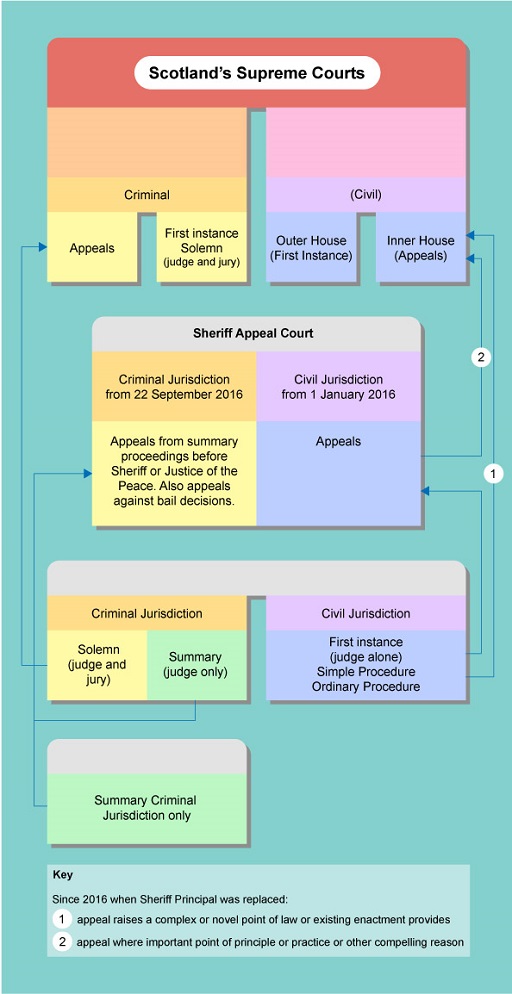1.3 Scottish Criminal Court Structure

Criminal Justice is a power devolved to the Scottish Parliament. However, Scotland has long had a unique court and criminal justice system which is very different to that within the rest of the UK.
There are two types of criminal justice procedure in Scotland; Solemn procedure and Summary procedure.
The choice of whether to prosecute a case under solemn or summary procedure is made by the prosecution service, known as the Crown Office and Procurator Fiscal Service (COPFS). This affects the sentences available to the court on conviction. The vast majority of criminal court cases are dealt with under summary procedure – 59% of criminal court disposals during 2010-11 were in the summary sherriff courts, 4% in the solemn sheriff courts and 37% were heard by lay magistrates.
Solemn procedure involves the most serious of criminal cases and may ultimately lead to a trial either before a judge in the High Court or before a sheriff in one of the sheriff courts. Trials under solemn procedure are conducted with a jury.
Summary procedure is used for less serious offences (with the charges set out in a complaint) and may ultimately lead to a trial before a sheriff or, in justice of the peace courts. Trials under summary procedure are conducted without a jury.
A jury in a Scottish criminal case is made up of 15 people, with a simple majority (8 or more out of 15) sufficient to establish guilt.
Scottish courts can deliver one of three possible verdicts: guilty, not guilty, and not proven. The not proven verdict is unique to Scotland and has been controversial in the past. Essentially the not proven verdict means that the jury believes the accused may have committed the crime but does not have sufficient evidence to award a guilty verdict. On the other hand, it is not sufficiently convinced that the accused is not guilty. Note that there is not a verdict of innocence. An accused is innocent until proven guilty.
1. High Court of Justiciary
The High Court of Justiciary is Scotland's supreme criminal court. When sitting at first instance as a trial court, it hears the most serious criminal cases, such as murder and rape. A single judge hears cases with a jury of 15 people.
At first instance, it sits in cities and larger towns around Scotland and has a permanent base in Edinburgh (Lawnmarket), Glasgow (Saltmarket) and Aberdeen (Mercatgate). There are periodic sittings in Dumbarton, Lanark, Livingston, Paisley and Stirling. As an appeal court, it sits only in Edinburgh.
Judiciary
The High Court is presided over by the Lord Justice General and the Lord Justice Clerk. They usually sit as chairpersons in the courts of criminal appeal. The other full time judges, who are also Senators of the College of Justice, are known as Lords Commissioners of Justiciary when sitting in the High Court.
Appeal Court
When sitting as an appeal court, the court consists of at least three judges when hearing appeals against conviction and two when hearing sentence appeals. More judges may sit when the court is dealing with exceptionally difficult cases or those where important matters of law may be considered. Appeals are heard from the High Court. The High Court also hears appeals in cases referred to it by the Scottish Criminal Cases Review Commission.
The Lord Advocate may refer a point of law which arises in the course of a case to the High Court for an opinion. This allows the High Court to give directions which set out the law for future similar cases.
Prosecution
Cases in the High Court are prosecuted by advocate deputes, they are advocates or solicitor-advocates who are appointed by the Lord Advocate, in whose name all prosecutions are brought in the public interest. It is possible, although extremely rare, for a private prosecution to be brought.
Defence
The defence will usually be conducted by an advocate or solicitor-advocate. Advocates are members of the Faculty of Advocates and have a status and function corresponding to that of a barrister in England. Advocates once had an exclusive right of audience in the High Court but, since 1990, they share that right with solicitor-advocates. Solicitor-advocates are members of the Law Society of Scotland. They are experienced solicitors who obtain an extension of their rights of audience in the lower courts by undergoing additional training in evidence and in the procedure of the High Court. I
2. Sheriff Court
Criminal cases are heard by a sheriff and a jury (solemn procedure), but can be heard by a sheriff alone (summary procedure). Civil matters are also heard by a sheriff sitting alone.
3.Sheriff Appeal Court Criminal
The Sheriff Appeal Court hears appeals arising out of summary criminal cases from both the sheriff and justice of the peace courts. The Bench generally comprises two or three appeal sheriffs, depending on the type of appeal to be considered. The Court also hears appeals against bail decisions made by a sheriff or a justice of the peace. These hearings are presided over by a single appeal sheriff. The criminal court sits in the courthouse at Lawnmarket, Edinburgh, while the civil court sits in Parliament House, Edinburgh. Civil appeals are heard by a bench of three appeal sheriffs sitting in Edinburgh, although procedural business, routine appeals and appeals from small claims and summary causes may be dealt with by a single appeal sheriff in the local sheriffdom.
4. Justice of the Peace Courts
Less serious criminal matters are heard in Justice of the Peace Courts at first instance. The JP courts are located in the same cities as the Sheriff Courts, but there are additional JP courts in other locations throughout Scotland. From 2008 to early 2010, Justice of the Peace Courts gradually replaced the former District Courts which were operated by local authorities.
